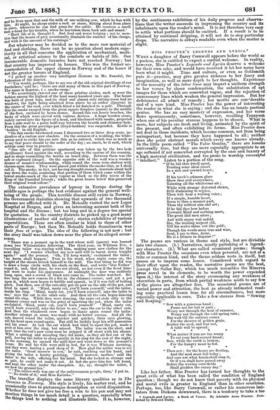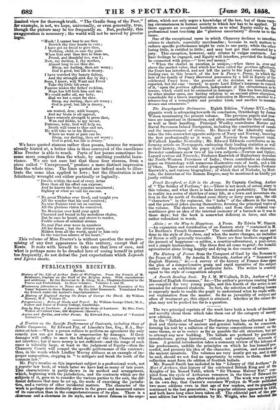MISS PROCTER'S LEGENDS AND LYRICS. * WHEN a daughter of Barry
Cornwall appears before the world as a poetess, she is entitled. to expect a cordial welcome. In reality, however, Miss Procter's Legends and Lyrics deserve a welcome for their own sake, and would have received it let her name have been what it might. Time and culture, or even as Goldsmith puts it—practice, may give greater richness to her fancy and imagination, as well as more depth to her thoughts. Experience of the necessity of the labor linux may impart a uniform strength to her verses by closer condensation, the substitution of apt images for those which are somewhat vague, and the rejection of unnecessary lines which weaken the general impression. But her deficiencies all admit of remedy ; her merits are conPiderable and of a rare kind. Miss Procter has the power of interesting the reader in what she is saying ; and she has an innate poetical genius. She has an easy mastery of expression, and her verse flows spontaneously, sometimes, however, recalling Tennyson when one of his peculiar stanzas happens to be chosen. What is more, her subjects are fresh and living, animated by the spirit of the present, and often exhibiting its forms. Miss Procter does not deal in those incidents, which become common, not from being unimportant, but because they have happened to all; neither does she point abstract morals which every one knows already. In the little poem called "The False Genius," there are lessons universally true, but they are more especially appropriate to an age softened if not somewhat corrupted by the ease and luxury of a high material civilization, and too prone to worship successful "intellect." Listen to a portion of the song.
"If he bid thee dwell apart, Tending some ideal smart In a sick and coward heart; • • If his torch's crimson glare Show thee evil everywhere, Tainting all the wholesome air ; While with strange distorted choice, Still disdaining to rejoice, Thou wilt hear a wailing voice ; If a simple, humble heart, Seem to thee a meaner part, Than thy noblest aim and art ; If he bid thee bow before Crowned Mind and nothing more, The great idol men adore; And with starry veil enfold Sin, the trailing serpent old, Till his scales shine out like gold; Though his words seem true and wise,
Soul, I say to thee, Arise, He is a Demon in disguise !"
The poems are various in theme and style, but are divisible into two classes. (1.) Narratives, mostly partaking of a legend- ary character. (2.) What are called occasional poems ; though with Miss Procter the occasions even when personal, are not of a trite or common kind, and the theme seldom rests in itself, but passes on to impress some lesson. Considered with regard to their effect upon the reader, the narrative poems are the best, (except the Sailor Boy, which too much resembles the Minerva press novel in its elements, to he worth the power expended upon it,) the interest of the story overcoming any weakness of execution in parts, from which partial weakness sooth to say few of the pieces are altogether free. The occasional poems are of varied power and attraction, the best as already intimated read- ing some practical lesson true for all circumstances, but more especially applicable to ours. Take a few stanzas from "Sowing
and Reaping."
"Sow with a generous hand ;
Pause not for toil or pain ; Weary not through the heat of summer, Weary not through the cold spring rain ; But wait till the autumn cornea For the sheaves of golden grain.
Scatter the seed, and fear not, A table will be spread; • What matter if you are too weary To eat your hard-earned bread ; Sow, while the earth is broken, For the hungry must be fed.
"Then sow ; for the hours are fleeting, And the seed must fall today ; And care not what hands shall reap it, Or if you shall have passed away Before the waving corn-fields Shall gladden the sunny day."
Like her father, Miss Procter has turned her thoughts to the great evils of what has been called the condition of England question ; though we do not know that poverty with its physical and moral evils is greater in England than in other countries. Perhaps, too, like Barry Cornwall, or rather his numerous imi- tators from Dickens downward, there is a tendency to take a too
• Legends and lyrics. A Book of Verses. By Adelaide Anne Procter. Pub- lished by Bell and Daldy.
limited view for thorough truth. "The Cradle Song of the Poor," for example, is not, we hope, universally, or even generally, true though the picture may be too frequently so. But, probably, this exaggeration is necessary ; the world will not be moved by precise
aagm
"Hush ! I cannot bear to see thee Stretch thy tiny hands in vain ; I have got no bread to give thee, Nothing, child, to ease thy pain.
When God sent thee first to bless me, Prowl, and thankful too, was I; Now, my darling, I, thy mother, Almost long to see thee die.
Sleep, my darling, thou art weary ; God is good, but hfe is dreary.
I have watched thy beauty fading, And thy strength sink day by day ; Soon, I know, will Want and Fever Take thy little life away. Famine makes thy father reckless, Hope has left both him and me; We could suffer all, my baby, Had we but a crust for thee.
Sleep, my darling, thou art weary ; God is good, but life is dreary. • * • am wasted, dear, with hunger, And my brain is all opprest, I have scarcely strength to press thee, Wan and feeble, to my breast. Patience, baby, God will help us, Death will come to thee and me, He will take us to his Heaven, Where no want or pain can be. Sleep, my darling, thou art weary ; God is good, but life is dreary."
We have quoted stanzas rather than poems, because for reasons .already hinted at, a better idea is thus conveyed of the excellence Miss Procter is able to reach. Parts of her poems sometimes be-
aome more complete than the whole, by omitting youthful luxu- riance. We are not sure but that these four stanzas, front a piece called " Unexpressed," produce a more distinct impression than the whole nine. The lines quoted are indeed made to illus-
trate the same idea applied to love but the illustration is not felicitously wrought out either poetically or logically.
"Dwells within the soul of every Artist More than all his effort can express; And he knows the best remains unuttered; Sighing at what we call his success.
"No great Thinker ever lived, and taught you All the wonder that his soul received; No true Painter ever set on canvass All the glorious vision he conceived.
No Musician ever held your spirit Charmed and bound in his melodious chains, But be sure he heard, and strove to render, Feeble echoes of oeleetial strtuns.
No real Poet ever wove in numbers All his dream - but the diviner part,
Hidden from all the world, spake to him only
In the voiceless silence of his heart."
This volume of Miss Procter's is without question the most pro- mising of any first appearance in this century, except that of
Rests. It rests with herself to take care that love of ease, and 'what is perhaps more to be dreaded love of seeing herself in print too frequently, do not defeat the just expectations which Legends ond Lyrics create.



























 Previous page
Previous page